Daimler Buses launches new series Setra MultiClass 500 LE. With weight savings, hybrid module, one more length
Daimler Buses has launched a newly developed Setra MultiClass 500 LE. Shortly after the premiere of the next generation of the Setra ComfortClass 500 and TopClass 500 touring coaches, Setra is opening a new chapter in the intercity segment. The new model series features the second generation of Predictive Brake Assist 2, optionally available from […]
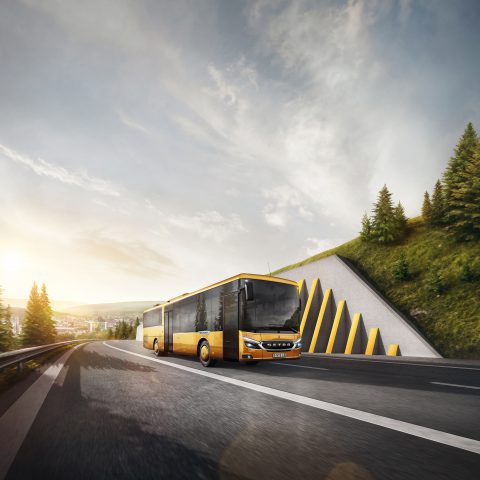
Daimler Buses has launched a newly developed Setra MultiClass 500 LE. Shortly after the premiere of the next generation of the Setra ComfortClass 500 and TopClass 500 touring coaches, Setra is opening a new chapter in the intercity segment.
The new model series features the second generation of Predictive Brake Assist 2, optionally available from spring 2024. Further driver assistance systems are in preparation for the MultiClass 500 LE, such as the Sideguard Assist 2 turning assistant, which is installed on both sides.
What is interesting, weight has been reduced by around 300 kilograms. “One example: The MultiClass S 515 LE, with its traditional format of around twelve meters in length, weighs just under twelve tons in its standard version. This means a lower fuel consumption with the same occupancy or an increase in the maximum passenger seats. Depending on the model, this increases by up to six people”, Setra says.
The new Setra MultiClass 500 LE will also be also manufactured at the Daimler Buses Hosdere plant near Istanbul in Turkey. The start of production for the traditional two-axle vehicle sizes with lengths of around 12 and 13 meters is planned from autumn 2023. The compact S 510 LE and the three-axle S 518 LE are expected to follow from the beginning of 2024.
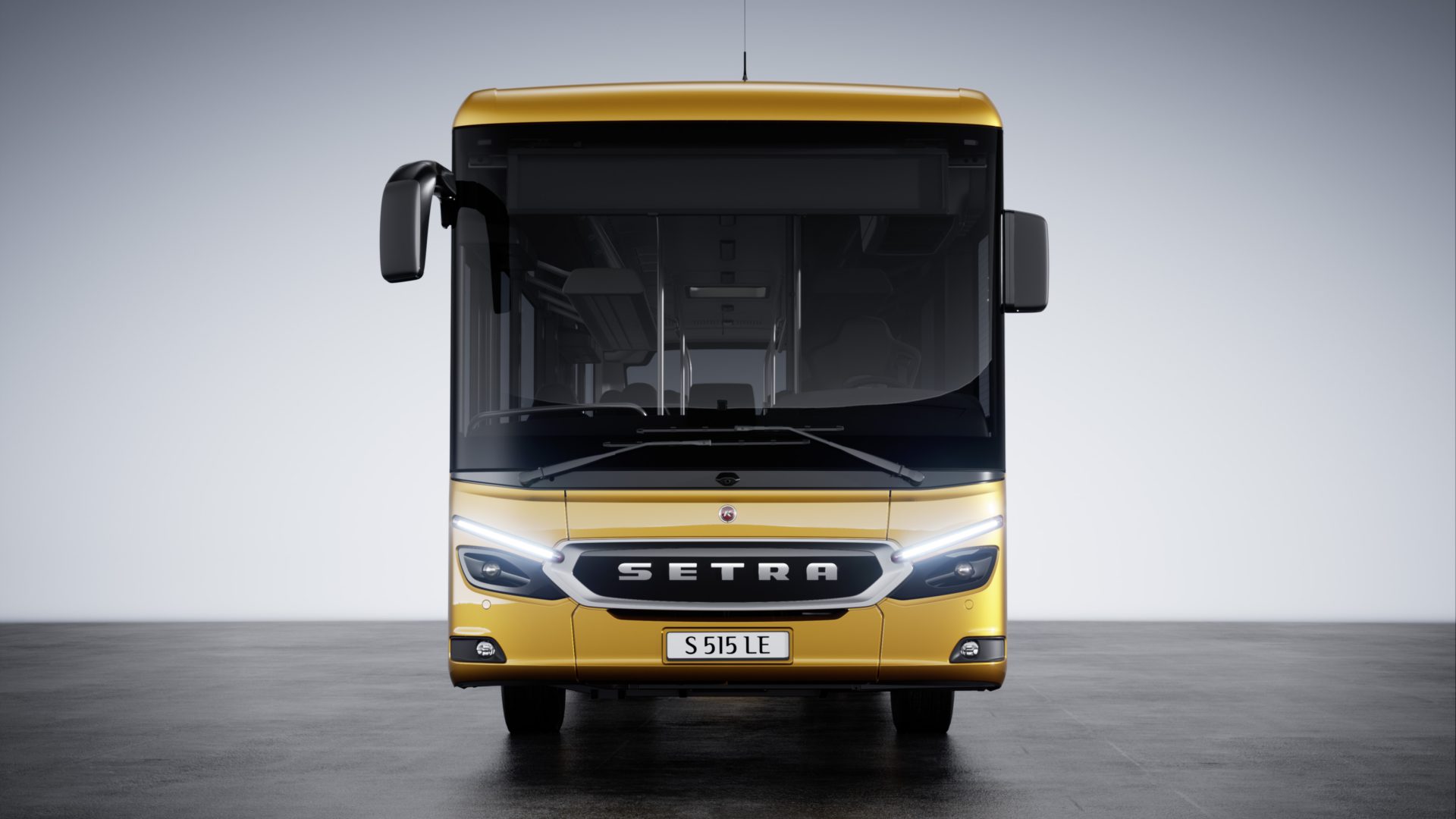
New Setra MultiClass 500 LE, four vehicles instead of 3
The new MultiClass 500 LE range now includes four models instead of the previous three. As low entry (LE) vehicles, the quartet combines two worlds: Low-floor convenience and travel comfort. Now the model lengths range from 10.51 to 14.52 meters. Setra states that they have been designed for a wide range of applications, from peri-urban to long-distance inter-city transport in sparsely populated regions. Accordingly, the buses can be registered in accordance with both class 1 (city regular-service bus) and class 2 (inter-city bus).
Up to just in front of the rear axle, it has a consistently low-floor design. This benefits all passengers, but particularly persons with reduced mobility. Three low-rise steps lead into the rear section in front of the rear axle.
Predictive Powertrain Control (PPC) debuts in inter-city transport
In conjunction with the fully automated GO 250-8 PowerShift manual transmission, the driver is supported by the latest version of the Predictive Powertrain Control (PPC) cruise control. It integrates a driving style into the automatic gearshift system which has been adapted to the topography. In addition to motorways and highways, PPC’s extended map material now covers almost all country roads in Europe, Daimler Buses states.
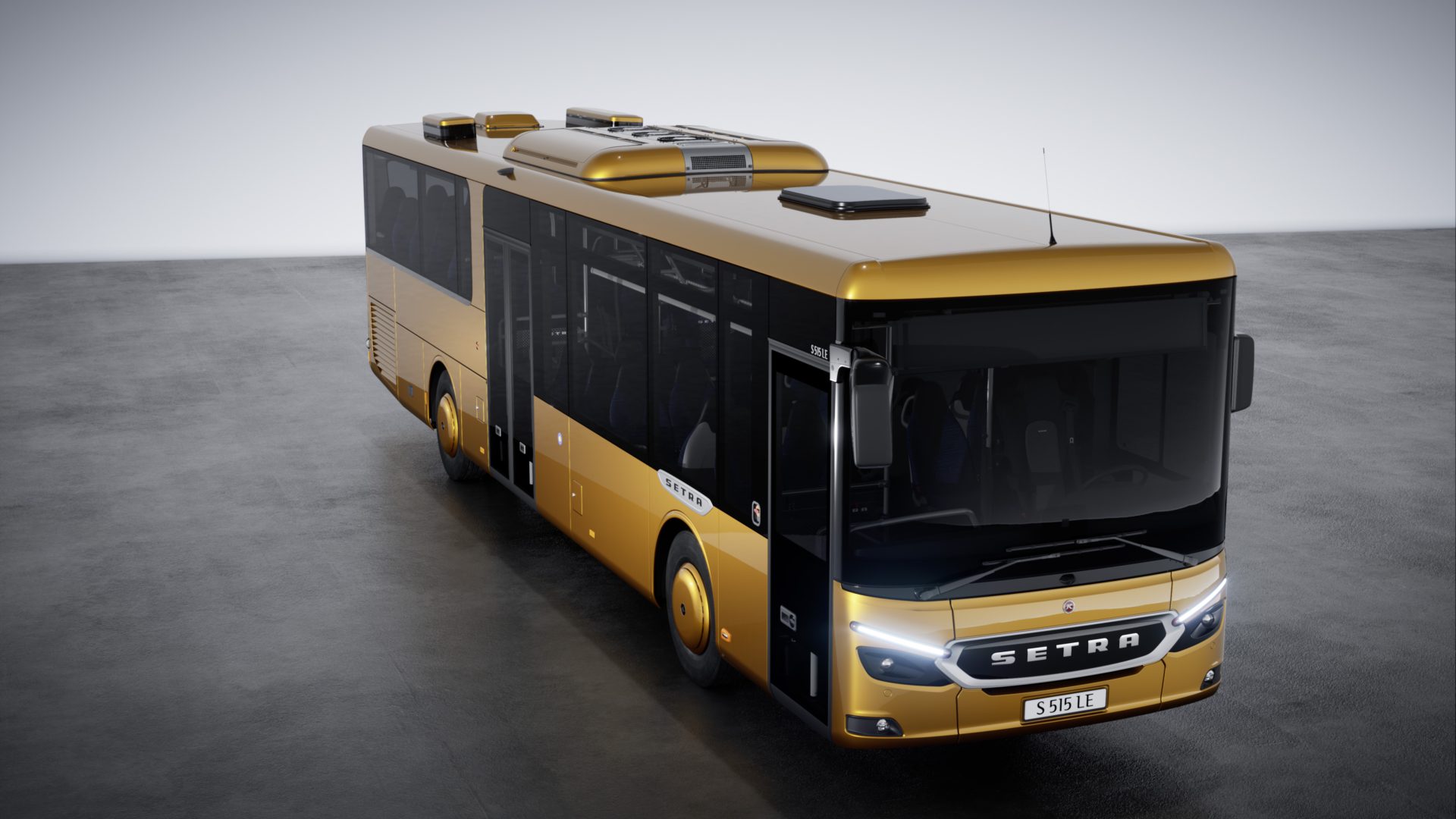
PPC takes into consideration intersections and traffic circles, and is linked to adaptive cruise control. Based on the stored maps, PPC automatically reduces the speed when entering towns and cities, as well as ahead of country road bends with a tight radius or obstacles such as traffic circles and stop or right-of-way points.
A variety of components contribute to the decreased weight. Compared to the predecessor, developers have gained 80 kilograms in the body-in-white for example, 65 kilograms in the interior, around 50 kilograms in the chassis with a modified connection of the stabilizers to the front and rear axles as well as air springs with plastic pistons and around 30 kilograms in the heating/ventilation/air-conditioning unit, and 17 kilograms in the axle drive.
Under the bonnet of the new Setra MultiClass 500 LE
The OM 936 six-cylinder in-line engine with 7.7-liter displacement operates at the rear of the two-axle vehicles. It is available in two output levels of 220 kW (299 hp) and 1200 Nm torque or 260 kW (354 hp) and 1400 Nm. The three-axle flagship MultiClass S 518 LE is consistently fitted with the OM 470 six-cylinder in-line engine and a displacement of 10.7 liters. It delivers 290 kW (394 PS) with a powerful torque of 1900 Nm.
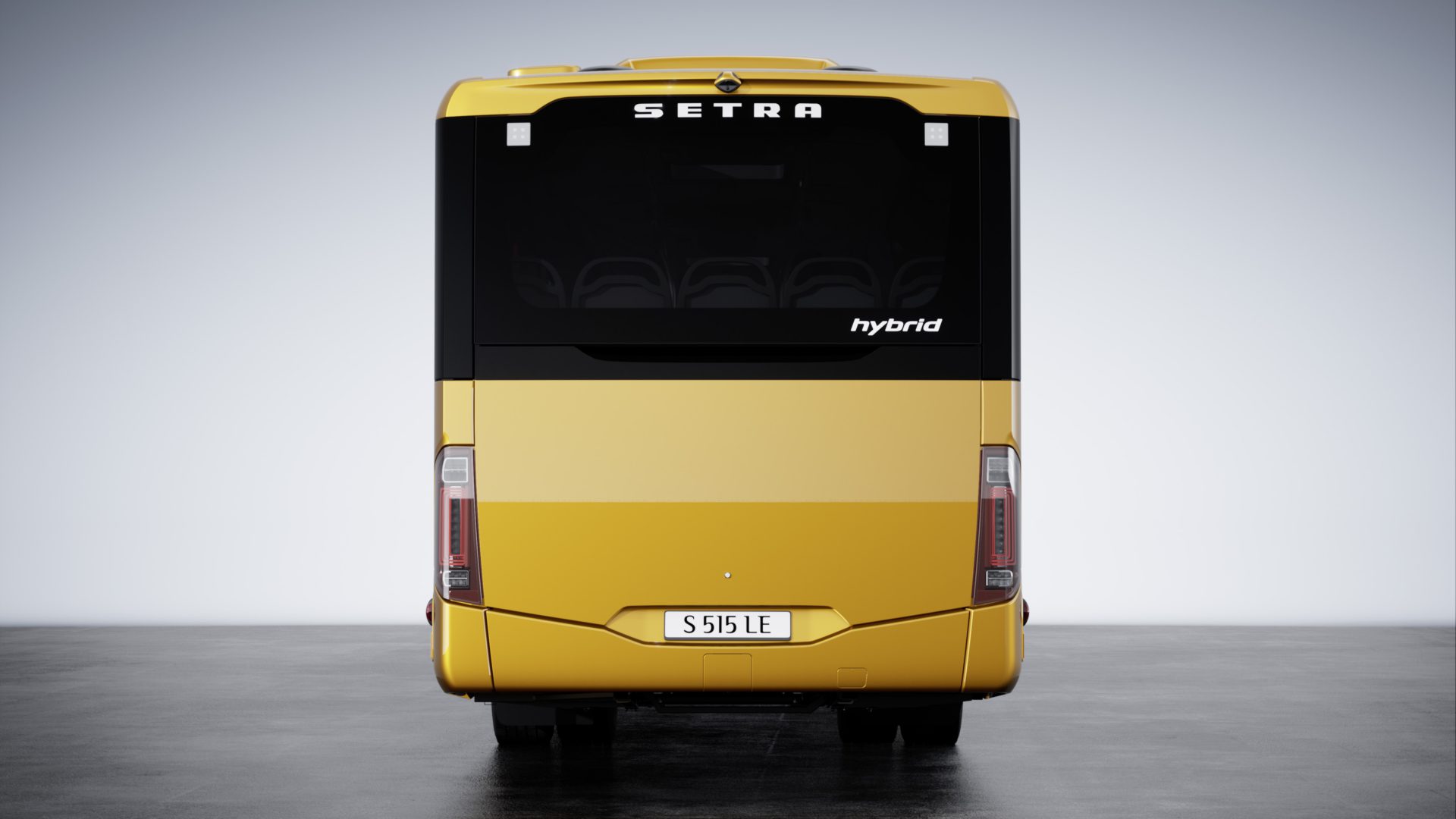
A wide range of transmissions is available for power transmission. The GO 190 manual transmission and the fully automated GO 250-8 PowerShift manual transmission (260 kW/354 hp output level only) are available for the two-axle variants. If enterprises want an automatic converter-clutch unit, they can choose between ZF Ecolife 2 with six gears, boasting optimized consumption and a longer service life compared to the previous model, and the new Voith Diwa NXT transmission with a second overdrive and seven gears.
For the three-axle MultiClass S 518 LE, customers can choose between the fully automated GO 250-8 PowerShift manual transmission and the ZF Ecolife 2 automatic converter-clutch unit.
Mild hybrid version in portfolio
The MultiClass 500 LE with the OM 936 in combination with the optional hybrid module is even more economical. A disk-shaped electric motor is fitted between the engine and transmission in the drivetrain. If the bus operates in overrun or braking mode, the electric motor functions as an alternator and generates electricity without fuel consumption. The electric energy is stored in two storage modules on the roof, also called supercaps. In load situations, such as when moving off, the 14 kW electric motor (which is likely to be the same used on the Citaro hybrid) supports the combustion engine with the energy from the supercaps. It is relieved of load and therefore consumes less fuel.
The new MultiClass 500 LE range now includes four models instead of the previous three. As low entry (LE) vehicles, the quartet combines two worlds: Low-floor convenience and travel comfort. Now the model lengths range from 10.51 to 14.52 meters. Setra states that they have been designed for a wide range of applications, from peri-urban to long-distance inter-city transport in sparsely populated regions. Accordingly, the buses can be registered in accordance with both class 1 (city regular-service bus) and class 2 (inter-city bus).
New Setra MultiClass 500 LE series, a modular platform
The new model range is based on a modular system, Setra stresses. The front overhang of 2,710 millimeters and the rear overhang of 3,300 millimeters are uniform across all vehicles. The door positions in front of the drive axle are also identical with a distance of 1,540 millimeters to the center of the wheel of the drive axle. Only the wheelbase and the number of axles vary.
Being into specific, below the description of the four models, in the words of Daimler Buses communication department:
– MultiClass S 510 LE: New compact inter-city bus. With a wheelbase of only 4,500 millimeters and a length of 10.51 meters, as well as a turning circle of only 17.3 meters and a maximum seating capacity of 39 seats, the extraordinarily agile, compact bus is ideal for narrow, hilly routes, winding mountain passes, but also narrow, old towns or services with low passenger volumes.
– MultiClass S 515 LE: With a length of 12.21 meters, two axles and up to 51 seats, this is a low entry vehicle in the traditional format, an all-rounder for almost any application in urban and rural areas.
– MultiClass S 516 LE: 12.92 meters long with two axles, giving a maximum capacity of 55 seats and therefore also maximum profitability as an inter-city bus, shuttle and school bus, as well as for company transport.
– MultiClass S 518 LE: With up to 63 seats, it is a giant in the low entry segment in terms of seating capacity. The longest Setra in the new model series has a length of 14.52 meters across three axles. This bus specializes in busy services and school trips, as well as long inter-city routes.
The design of the new Setra MultiClass 500 LE
The exterior of the new low entry vehicle is divided into two vehicle sections. The clear division of the passenger area as it were into front and back seats make the outside of the new inter-city buses appear less weighty, according to the manufacturer. Both segments are connected by a wide vertical profile. It is clad on the outside with an aluminum panel, painted in the color of the vehicle.
Thanks to the dark, rounded A-pillars at the front and the similarly shaped corner profiles at the rear, the conventional angularity resolves into soft and flowing shapes here.
The roof, Setra says, seems to float above the body of the inter-city bus: “The result is an airy, lightweight design that is unparalleled in the industry, without the austerity of conventional inter-city buses. This look is particularly striking when customers choose the darker of the two tint levels for the side windows”.
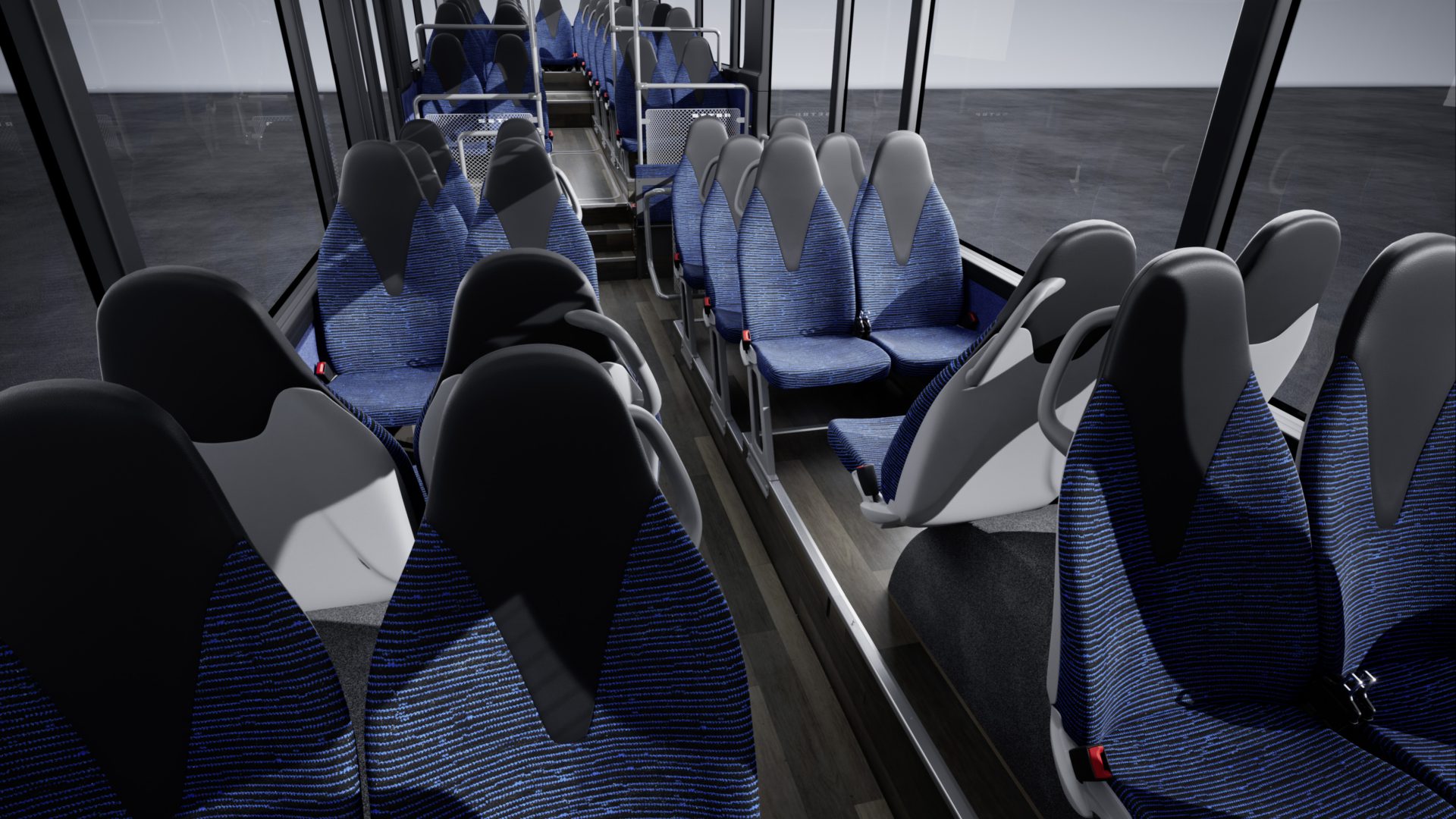
At the front, the MultiClass 500 LE takes on the new Setra distinctive look that the brand introduced with the current touring coaches (chrome-plated brand lettering black front mounting plate and black headlights with standard full LED lamps).
New LED lighting elements above the headlights are reminiscent of eyebrows. They combine turn signal lamps, clearance lamps and daytime running lights. They originate from the new generation of Setra touring coaches.
The second generation of Predictive Brake Assist 2.
The bus features the second generation of Predictive Brake Assist 2, optionally available for all models of the new Setra MultiClass 500 LE from spring 2024. It will join Electronic Stability Control (ESP), Anti-lock Brake System (ABS) and anti-slip control.
Preventive Brake Assist 2 uses a combination of close-range and long-range radar sensors and a camera to respond to stationary and moving objects, including pedestrians and cyclists. The system can process multiple objects at the same time. In addition, objects outside the roadway, such as traffic signs, parked vehicles or traffic in adjacent and opposite lanes, are detected even better within the framework of the system boundaries, thus minimizing false warnings, the manufacturer says.
The driver assistance system warns the driver of a collision with stationary or moving objects both visually and audibly using a red warning on the central display. At the same time, it automatically initiates a braking maneuver with partial braking. Partial braking is applied until either the driver intervenes, the situation is no longer critical or the bus comes to a standstill. The series of warnings and brake application have been designed precisely for use in regular service and thus to protect standing passengers.
The variability of the new Setra MultiClass 500 LE
What about door selection? For entrance one, a single-leaf door is available in two widths of 900 and 1,150 millimeters as well as an even wider double door and a passage width of 1,380 millimeters as a new addition. Entrance two can be selected as a single-leaf or double door (1,150/1,380 millimeters). For the first time, all models can also be fitted with a third door behind the rear axle (900 millimeters wide) on request. All doors are glazed down to the floor.
Companies can choose between outward-swivelling doors, inward-swivelling doors and swing/sliding doors. Depending on the door variant and the tire size, a mechanical folding ramp, a double ramp with a combination of electric and mechanical ramps and an electric sliding ramp are also available at entrance two.
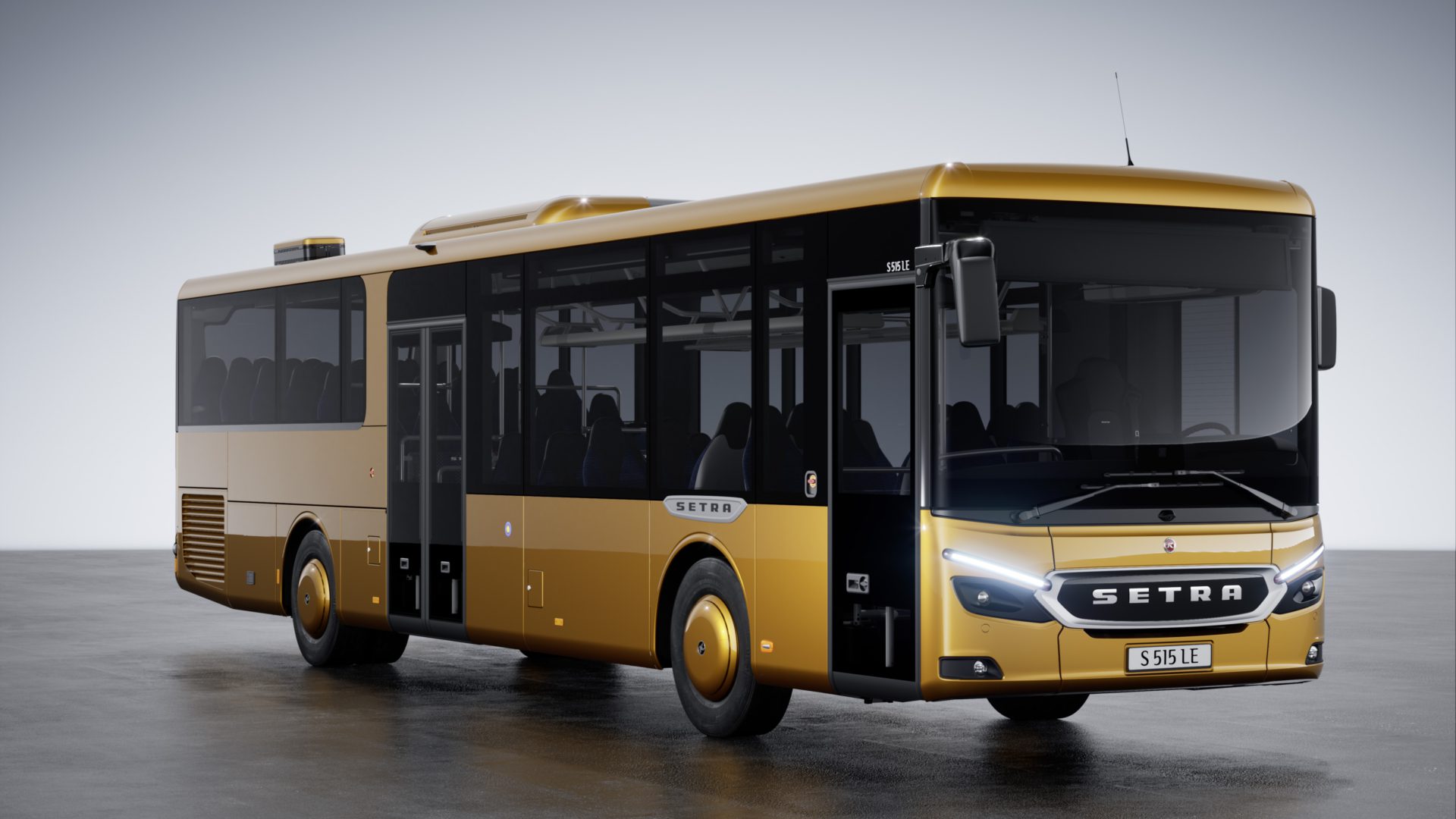
What about folding ramps?
For the first time, a mechanical folding ramp for door one is also available. This is possible with variants without a platform, as the required aisle width is then available so that wheelchair users can get to their place safely in the special purpose area opposite entrance two. Wheelchairs can be securely fastened there either with practical mushroom-head connectors and seat belts or with seat belts recessed in the platforms. Alternatively, it is possible to have a special purpose area on the right-hand side in the direction of travel.
The entry height – “kneeling” not included – in the front section at entrance one is between 311 and 314 millimeters for 275/70 R 22.5 tires for city buses. With 295/80 R 22.5 inter-city bus tires, it does not increase to more than 355 to 358 millimeters.
Air conditioning, many variants
In addition to the amount of space available with a standing height of around 2,600 millimeters and comfortable seating, the climate control system ensures comfort on board the new buses. The side windows can be either single-glazed or double-glazed.
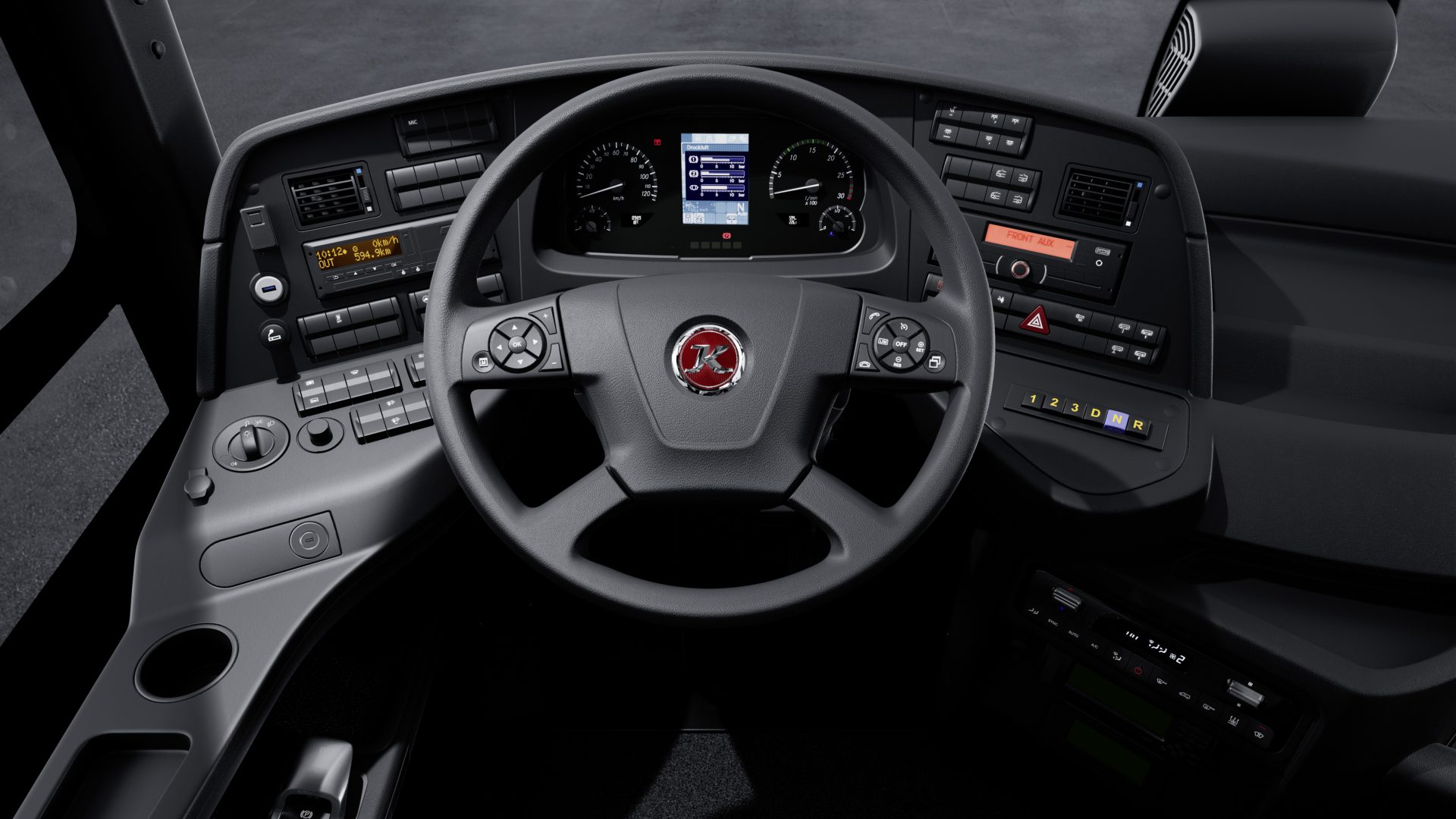
If climate control is desired, operators have the choice. The first stage is an air-conditioned driver cockpit. If temperature control of the passenger area is sufficient in regions with mild climates, a new version called EvoCool light Basic with two roof-mounted air-conditioning modules and an output of 12 kW each is ideal. In this case, air outlets are arranged centrally on the underside of the air-conditioning modules above the center aisle. The classic EvoCool Basic roof-mounted air-conditioning system operates with an output of 32 to 39 kW, depending on the model. In this case, the cooled air is distributed via roof ducts with air outlets in the passenger compartment. As special equipment, it is possible to equip the vehicle with air nozzles and reading lights in conjunction with the roof-mounted air-conditioning system, another example of the versatility of the new MultiClass 500 LE. All air conditioning systems are fitted with antiviral filters as standard.
Setra MultiClass 500 LE cockpit’s choices
There are three variants to choose from: Cockpit City (city), Cockpit Basic City (city/inter-city) or Cockpit Basic (inter-city), tailor-made for the respective application. As standard, all of them feature a closed rear panel – made of opaque plastic or acrylic glass – as well as a driver’s cab door. It welcomes boarding passengers with the embossed brand lettering and can be fitted with a protective screen up to full-surface glazing on request.
Two different makes are available for the driver’s seat. The seats can be attached in four different positions. They can be adjusted in a variety of ways and can be individually customized, including climate control.
The standard version is the Cockpit Basic for inter-city use. It has been practically designed for the assembly of cash register and payment systems for regular service. The new, optional communications compartment with storage compartments above the driver’s workplace accommodates electronic devices. It has been significantly enlarged compared to the previous model.
Alternatively to the communications compartment, a stowage compartment can be supplied for the driver. If luggage shelves are ordered, storage compartments are also possible in the front section on the left and right-hand side.
Focus on braking
The driver activates the parking brake manually by pulling the lever or by pressing the “P” button. They release the parking brake either by stepping on the accelerator pedal or by pressing the “P” button again. The integrated hold function is activated when the vehicle is stationary by stepping on the brake pedal more forcefully. The service brake is not released until the driver presses the accelerator pedal again. When moving off on hills, the system supports the driver with the additionally integrated starting-off aid. Finally, the parking brake is optionally automatically activated when the MultiClass 500 LE is stationary, the driver unfastens their seat belt and leaves their seat. This prevents the bus from rolling away unintentionally.
360 bird-view available
The optional 360° camera system offers perfect all-around visibility when maneuvering and in tight spaces. Thanks to this system, passers-by, cyclists and obstacles can also be detected in areas that are otherwise difficult or impossible for the driver to see. A total of four cameras at the front, rear and above the side windows detect the immediate vehicle surroundings of the vehicle and generate indirect 360° all-around visibility. The corresponding image from a bird’s eye view is displayed on a monitor in 10-inch format on the A-pillar. The screen is divided into two sections. There are five different views to choose from: 360° from a bird’s-eye view in full format and optionally supplemented by the images from the individual cameras. The second image on the monitor depends on the driving situation: Depending on which turn signal lamp is activated or whether or not reverse gear engaged, the view automatically switches to the corresponding side.
The driver can also select the required image from the menu on the screen. The views of the 360° cameras are displayed when driving forwards up to a speed of approx. 30 km/h and always available when driving in reverse. Markings on the front and rear edges of the bus – as well as a suggested driving path – make it easier for drivers to get their bearings. The views reflect a field of vision up to a distance of around five to six meters, keeping adjacent lanes covered.
The ambient lighting for reversing is also available as a significant support for maneuvering. The corresponding LED lights pointing diagonally to the rear are mounted on the wheel arch flaps of the drive axle.
Needless to say, the MultiClass 500 LE fulfills the specifications in accordance with ECE R 66.02 for the rollover test and, on request, voluntarily meets the requirements of the pendulum impact test in accordance with ECE R 29.
A look at suspensions
The suspension components are based on known dimensions. For now, this applies to the ZF RL 82EC low-floor front axle, which is also used in other Daimler buses and touring coaches. The quiet and fuel-saving RO 440 hypoid drive axle is a comfortable touring coach axle. There are now even more gear ratio variants from i=3.1 to i=5.87 available to suit different applications and transmissions. This means that the MultiClass 500 LE always runs with a perfectly adapted drivetrain. Finally, the third axle of the MultiClass S 518 LE is an actively steered trailing axle with independent wheel suspension.







